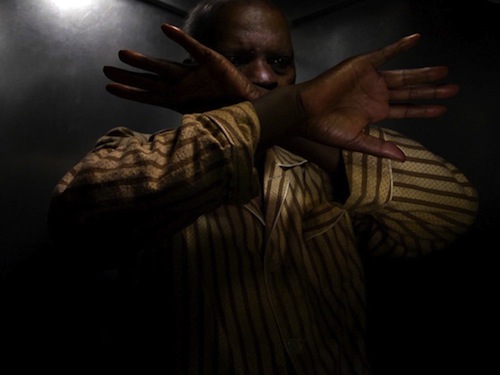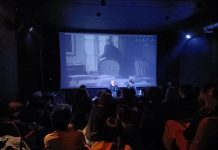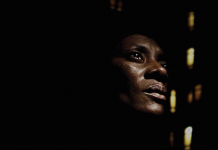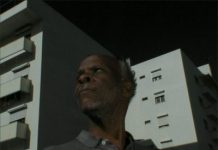
Pedro Costa came to the UK at the beginning of October, 2012. He initially arrived in Cambridge University for a screening of In Vanda’s Room, then he traveled down to the capital to take part in a pair of Q&As following presentations of the newly remastered Second Run DVD release of Casa De Lava and a 35mm print of Ne change rien. As Ne change rien played, I sat and waited with Costa in the bar of London’s ICA cinema and, with a tape rolling on the table, we started to talk.
DAVID JENKINS: How does the projection look?
PEDRO COSTA: It’s great. It must be the projectionist. The sound and the image are perfectly balanced. The other day I got hold of the first DCP of Historic Centre and the girl who screened our test was the popcorn girl. Which is okay, but…
JENKINS: Do you ever envisage working in 35mm again?
COSTA: More than ever. I waited for this moment until I changed to the small cameras. I had this dream. If it stays the same price I could do another film in 35mm. Or, at least, shoot digital and then screen the film in 35mm. That’s what I want. It’s the screening rather than the shooting. Something that annoys me: the fake stillness of digital. The depth and distance of things with DCP is very fake. We, filmmakers and technicians, feel that blacks are not black. Sometimes an American film gets there, but…
JENKINS: How do you feel about the cameras? Are you now used to the logistical flexibility of digital?
COSTA: The ones that I began using and that I still use now are very small. They’re amateurish, accessible to everyone. I’m not into the mythology of… [sings] ‘ah-ha-ha, cinema, etcetera…’ Actually I was fed up and tired because of myself and because of my first film [1989’s O Sangue] especially. I couldn’t stand it. That doesn’t mean I like the screenings to have what they always have which is distance, scale and scope. I’m just a filmmaker. But if you talk to a DP or a lab technician they’ll say the same thing. It’s not there. It’s not there.
JENKINS: When you get requests to screen your films, do you have any say as to how they’re screened?
COSTA: Yes. I’m with my films, the products. I have a friend and a colleague who works a little bit on the details, but I usually get one mail a day asking for prints for films. Which is good because I live on that. Since, I would say, a little less than a year, it’s been harder and harder to suggest people take prints rather than DCPs.
JENKINS: What reasons do people give for not taking prints?
COSTA: If you’re in Europe, they always mention the money, the crisis, the state we’re in. If you have a print of, say, In Vanda’s Room, it’s a long film so it’s about nine reels. Sending a normal film of about six reels, that’s going to weigh about 27 to 33 kilos. Every filmmaker knows that. You would pay between €150 to €200 both ways. Imagine a DVD or a DCP? It’ll cost nothing. So it’s transportation that’s the problem. There’s also the issue of this screen here—the reason it’s perfect is because of the guy in the booth. The guy is absolutely paranoid about his work, which is good. He’s not young. He said to me, ‘Any time I get a 35mm print, I try to respect it.’ I don’t pretend to be one of the first to use the small cameras. I did it because I wanted to make the picture bigger. Paradox or contradiction? I wanted to be as close to 70mm as possible. Really. And I was almost there. Everyone was going down and I was going up. I was doing technical things that were absurd, like transferring MiniDV to film and correcting the colour.
JENKINS: Do you enjoy the post production demands of filmmaking?
COSTA: Oh yes. It’s part of everything. I’ve been in this business a long time and I’ve seen filmmakers walk into labs in London or Berlin and they’re only there to see the final print. They just do the final day. I’m a romantic so I tend to believe that Mr. Hawks wasn’t like that. And Mr. Lang. Even Mr. Godard or Mr. Antonioni or Mr. Rossellini… and Rossellini was a crazy.
JENKINS: Do you aspire to be like those directors?
COSTA: No, I aspire to be a director, a filmmaker. Even the worst filmmaker in the world would aspire to be like those guys. But in two years I’d just like to breathe or be human and have ears and eyes and hands. I think I know what’s going to happen with filmmaking. Not filmmaking, but capturing reality. That’s what I thought film was. You could turn it upside down. If you put the camera here and capture this, and this is a table and chairs and lights. That’s what you’re going to see. With mise en scène or special effects you can turn it upside down again. Anyway, it’s the reality that we have, very simple and tangible. I thought that was filmmaking, and I liked it. I wanted that to continue.
JENKINS: Did that idea arrive with you after a long process of thought?
COSTA: No. I turned into a cinephile and then turned back into a non-cinephile very quickly. I saw a lot of normal films. My life was normal. I was studying history. I think I still like certain things—history, the past, researching, going to places, watching things. Suddenly, at that moment, at fifteen or sixteen, there’s poetry coming in. It’s always poetry for me. My country—you’ve probably heard about it—is very poetic. In a bad sense and a good sense. It’s relatively important there. We have great poets. They never stop writing. It came in, and with poetry there was music. And music for me was rock, was pop. I didn’t study music. It was guitars. I was between all those things. But not film. Film I was seeing because I lived more or less alone when I was young. My mother and father were divorced, so a classic situation. I was left alone, life was cheap and film screenings were very, very cheap. I saw everything. I especially liked the centre of town. There was just three or four guys watching…everything.
JENKINS: Did you talk to people about the films?
COSTA: No, that was later. That’s when I began to confess with two or three friends in a room. This was at about eighteen. And then we talked about some music and some books. You talk about Orson Welles and Eisenstein. You see different things, like War & Peace by Sergei Bondarchuk. Don’t go and see that film. It’s awful. Let it be recorded nice, plain and clearly. When I was young, if I was weaker it could have ruined my life. It was awful. I hadn’t read the book and so I went to see the film, and later I spent a vacation reading the book…My God… So, yes, I cannot tell you it was like this or like that or that I saw a film. It was more a vague poetic thing.
JENKINS: Do you remember when you got your first camera?
COSTA: No. What I wanted to do was to play music. That time was the post-punk era. The eighties. I was twenty years old. Even punk was finished. First The Raincoats appeared. I didn’t like that. My favourite things in rock are the most violent and aggressive. I had this friend and we went to his room and he would write. I didn’t know about writing, it wasn’t my thing. I was not gifted. One day by chance we saw in the newspaper an ad for film school admissions. This was a relatively new thing. It started up in 1976. I told him, ‘let’s go and see this’. There was photography and technical things. So we went and we got in.
JENKINS: Were you academic?
COSTA: No. Admission to this film school was mainly an interview. You were supposed to explain why you were there. Then they asked me to write about whatever, so I wrote about…a Portuguese film that you don’t know, absolutely not. I wrote badly, I might add. This was an example of experimental work. It’s a film I didn’t like at all, so that’s why I don’t want to name it. The director died very recently. He was a very nice guy. The film was a nightmare to me. It was everything I didn’t want film to be. It was more a pamphlet. I think one of the teachers appreciated this, even though he liked the film. I know this because he told me. This teacher was António Reis. I hadn’t seen his films at the time. He seemed a little bit more on our side than the other two who were a little more… He wanted this kind of thing to be in the school.
JENKINS: Did you see yourself as bringing punk to film school?
COSTA: Yeah, but it’s like the Godard film: It’s not me, it’s the situation that’s problematic. At that moment, the situation was close to revolution. Schools at that time were very…hot. You form a committee and the teacher you don’t like is out immediately. That’s what I did. Yes, I confess. I can tell you why: I formed a posse to get rid of a teacher who showed us Julius Caesar by Mankiewicz. It’s the most fascist film around. No, the guy who shows this to young, virgin souls doesn’t have the right to teach.
JENKINS: So the school was very liberal?
COSTA: It was very anarchic. It wasn’t official at that time. It was a happening. It had material, cameras, projectors. But this was after a serious, nice, beautiful revolution in Portugal. We had teachers who couldn’t relate to us… There was another one who kept saying ‘me and François, me and François’. We asked, ‘who’s François?’, and as soon as he said Truffaut—out! He was very pretentious. You have to understand, if you wore a certain type of clothes you were out, if you had your hair a certain way you were out, if you said certain words you were out.
JENKINS: It sounds like a science fiction film.
COSTA: I’m sorry, but that’s history. We spat on teachers. I wrote ‘Ozu I Love You’ on the wall. It’s still there. But seriously, it was fun. Antonio calmed me down a lot.
JENKINS: Was he screening Ozu to you?
COSTA: No, not Ozu. They weren’t screening Ozu at that moment. He was someone we just knew. What we had in school were prints. We had Strike, Stromboli, Pierrot le fou, stuff like that.
JENKINS: It’s odd to think of those films being taught at film school.
COSTA: Well I can tell you a sad and funny story. The guy who came with me to film school is now a teacher. He stayed on. He’s been a teacher for twenty years. He is the best teacher in that school today. Everybody knows it. We were the ones who were closest to António . A year ago, he asked me to dinner. He told me that he screened Pierrot le fou. Twenty minutes after it started, the students asked for it to be stopped because it was going nowhere. Pierrot le fou? There’s guns and girls and colours. I mean really? If I was there, I would kick their fucking brains in. I would break their arms. I would break their necks. Really.
JENKINS: If you were screening Pierrot le fou to some students, do you think you’d need to explain it or contextualise it a little beforehand?
COSTA: It depends. 99 per cent of the time you’d have to explain. But ideally I’d let it run and then break their arms. Some violence is required. To be aggressive verbally is good. History is made of that.
JENKINS: Is this a bigger symptom of cinema in general?
COSTA: Well I have very mixed feelings about that. I have many colleagues, and when I say colleagues I say it with respect and admiration. Everything’s going back to, I don’t know… I was an assistant for a long time. I had a very painful, nightmarish life of late nights shooting and organising. I did lots and lots of films, but not many Portuguese. French, German, American. I know 3am the actress, I know 6am the actor, I know 9am the director. I remember one director crying. I remember one director panicking. Even if you’re strong and macho and say this is for macho guys, like Coppola, it’s not. I had this life, and then I made my films. When I made my films, I wanted to get rid of that. Not the crew, but the social nuisance. There should be a mirror in front of the camera, not behind. I saw the mirror behind, and what was behind was the boss, the slaves, the whores, the money. All the worst aspects. It wasn’t working for me. I tried to arrange something. I see everything coming back again in a very awful way. Like the Nazis are coming back. It’s digital, it’s DCP, it’s the way crews are formed… All this talk about digital, small cameras, democracy, it’s all bullshit. But just try to go to a lab and grade your film now. You have to pay much more than before. It’s more difficult to grade and mix.
JENKINS: Can filmmakers not do these things themselves?
COSTA: Sure. But where are they? That’s what bugs me. All these talks and discussions and round-tables between filmmakers, critics and scholars… Where are they? You can only see Carax and me and Assayas and Fincher… Where are they? YouTube? The net? Galleries? Museums? Small spaces? Co-operatives? Cinema clubs? Nobody’s fighting any more. Let’s go back to the old form/content thing. Nobody’s doing it.
JENKINS: Is this especially bad in Portugal?
COSTA: It especially bad in the sense that we tend to give up sooner. We have this character. We’re very poor.
JENKINS: Is auteur cinema doomed to mediocrity?
COSTA: What annoys me is people not knowing some things, films, events, dates. That’s me, I’m from history. Fontainhas. There will be someone from Finland who’ll ask about Fontainhas. Fontainhas is Russia in ’17, it’s Hollywood in ’34. It’s not more or less than that. It’s a theme. It’s making a film at a place, like Mr. Hawks. Then, taking a chance or a risk. If you don’t have this chance, this risk, this human material, it’s not really film for me. It makes me anguished. It’s OK, though. I’ve done things, I will do some other things. I wouldn’t say it’s over, but I’ve done my thing.
JENKINS: There are people who would want you to make more films.
COSTA: I will make more films. I’m not saying that I won’t.
JENKINS: So you’re not doing a Béla Tarr.
COSTA: No, no. I’m the opposite of him. With all respect. I’m not saying I like his films or I don’t like his films. I do not evaluate his position, his status as a human, as a social agent or a petit bourgeois. So I understand all his reasons, I think. A similar thing is happening in my country, but not in a violent way. My problem is not film. It’s the people I work with. I’m not a fetishist. That’s one of the things I’m not. I’m not saying it’s bad, but it’s not the camera, it’s not the tripod, it’s not the light, it’s not the money. I hate money. I hate money. It’s what I have in front of me that scares me. If I see a girl or a man… like, for instance, Ventura who I’ve worked with. Three months ago his rent went from €200 to €400. It has to do with my next film. Absolutely. My colleagues do not have this problem. But I have this problem. I chose to have this problem. I’m not complaining. It has everything to do with film. I think I belong to a tradition that begins with…I will not say the names because you have to work it out.
JENKINS: Is there a difference between making films and making friends?
COSTA: Not always. I’m talking about a place that does not exist. The people I work with. When I hear people talk about “our film” of course there’s a sentimental… It’s not a reason to make films. My reasons for making films starts with something so small that I cannot identify it. But it has to be small.
JENKINS: Like a shot?
COSTA: No, it’s nothing cinematic. It’s never that. When it’s that, it’s ruined for me. I know a lot of my friends are like that, they have an idea for a shot or an idea for two shots or an association. That only comes to me in editing. For me it’s deceptive. It’s trying to figure out why something is sad. Or why is that person always there. I never make shots. The other day I was thinking of a guy I worked with and I kept seeing him, every day, stood in the same spot. Filmmaking is gathering the courage to ask him why. I have to know.
JENKINS: Are these questions secret?
COSTA: Almost. I want it to be as secretive as possible. But not in the beginning, no. They can have a perfume of secrecy.
JENKINS: Are your subjects okay with this method?
COSTA: Well, you know where I work and my subjects often want me to be more direct. This is the problem. Me or Straub or Godard… If you say you’re making a film for someone, then they say we cannot see ourselves in there, we can only see you… And they were right. Because that’s film. That’s the same kind of critique as—and this is a bit extreme—if you ask, is Stromboli a film about the fishermen and the harsh conditions of that life or Bergman? I would say Bergman. It’s the same kind of thing. I’m not in as strong a position as Rossellini to debate that, but I’m sure he had the same problems. Even if they were silent and imaginary. But I know they were there. But Stromboli lead to much larger and more abstract things. Like India.
JENKINS: Is that movie not lost?
COSTA: No. There are DVDs. And there are prints in France. First he went to Europe in ’51, then he did Socrates and that’s the end of his life. Kingdom of Ideas is pure abstraction. It’s a way of escaping. All of us have different ways of escaping.
JENKINS: Let’s return to the comment about your films being about you and not “them.”
COSTA: The problem is that—and not a lot of colleagues agree with this—I would like to have a system that grounds me. A system where people are not called artists. Mr. Hawks, Mr. Ford, Mr. Tourneur, Mr. Ulmer, Mr. Fleischer. They were not artists. They worked their hours. They were grounded by this thing and that thing. That’s what I wanted to create.
JENKINS: You would like your own studio system?
COSTA: A studio, a factory, a system. I know it’s bad and it’s awful but… I want a factory with communist relations. A place where you can make shoes, candy and films. The Soviet dream. A small TV station for the neighbourhood. Warhol’s TV. It could be that. It could be underground.
JENKINS: These tend to be the things that movies are made about.
COSTA: Absolutely. It’s exactly that. It’s being alone, and then trying to get away from your loneliness in every way: social, psychological, economic. What I see today is getting inside this bubble. I’m very amazed by films today. I’m not saying I dislike or hate them.
JENKINS: Do you see a lot of films?
COSTA: No, I don’t go. I prefer to watch football. DVDs, yeah. I saw The Girl With The Dragon Tattoo. That was the last one. The Fincher version. Okay, Fincher is a guy who thinks he’s a regular craftsman like Mr. Hawks. And he’s not the worst of the worst.
JENKINS: Some would say he’s pretty good.
COSTA: I would say he’s pretty good. Everything is wrong, of course. He shouldn’t be doing this. He should be doing things on my side. He would probably be much better than me. Fincher is exactly the guy I want to have on my side. It’s not me or Bergman or Straub or Godard—he is the guy. He’s in control, he has the power, he has the money. He can do it. Why doesn’t he do it? Nice guys try it. I try it, Erice, Kaurismäki, Oliveira, Gomes, the French all try it. Béla Tarr! But we cannot get there. Of course I see things. I do not agree in general with how they do things. But they’re not dumb. Sometimes they’re very effective in terms of pure efficiency.
JENKINS: Would you like to get into a system where you could be making one or two films a year?
COSTA: Yes, I would. But that will not happen. I just don’t do it because I work alone. And by that I mean I choose not to have producers. Lav Diaz is a bit like me. It’s not a courageous thing. I could have one. But that’s why I take so long. I could call ZDF in Germany or Film4 or something. I don’t know. I would have to have this guy who goes to Rotterdam and talk to this or that person. Sometimes it’s even worse. Late nights, seventh beer. That’s worse. I don’t have a producer so it takes me much longer.
JENKINS: Is that through any fear of being corrupted creatively?
COSTA: No. They are so lazy and so stupid. No, not stupid. I don’t believe in anything, you know? So I don’t want a guy who doesn’t believe in anything beside me. They’re saying we need to go to Germany and get money and I should believe him that it’s going to work. What I want is to believe in Ventura, Vanda, the bottle, my shot. Nobody more than them. It’s got to be pure in the Straubian sense. The camera is here and the distance between the subject has to be absolutely clear. The only thing I want to be certain of is this focal point. It’s not money, power, charm, cinephilia. Nothing can make this distance correct other than knowing what that distance is.
JENKINS: During your work as a filmmaker, do you feel you’ve developed the ability to judge that distance?
COSTA: That’s my work. It makes me dream and it makes me come back. I felt so right when I saw a film by John Ford and I’m in front of those people. It was a dream thing. It was a real thing. It meant something. Sometimes you wouldn’t agree. Perhaps a lot of times. Then came something else. It’s a promise more than a project. I go and see films by my colleagues and I don’t see this promise. Even Fincher. Which is a shame as he is the one who is connected to reality. I saw the girl, I saw the motorcycle, I saw the tattoo, it’s all right. It’s a bit too fancy, too chic maybe, but I understand. There’s the iPhone, the sex, the loneliness. It’s three hours because there’s a guy killing girls. Why not just have no-one killing anyone and having a girl with a motorcycle? Can he do this? I think he can. I sent a message to his DP who I know very well. I said, “Avoid the killings. Three hours without the killings. You can have the Bond guy. Let’s set it in Sweden for the yellow light. You can have the editor, the lover, the challenge between young and old, bodies coming together. I understand those fetishes. Let’s avoid every single murder, killing, weapon. That’s the challenge.” I have to deal with this. You can see The Big Sky and analyse it shot by shot. It’s an amazing piece of craft. But you have to do a little bit more. It’s about destiny. It’s about going beyond something. It’s about love. It’s about racism, humiliation, pain. And it’s a long film. It’s big. Big scope! The Big Sky! The Girl With The Dragon Tattoo should be a remake of that film.
Entretien initialement publié sur Mubi.




